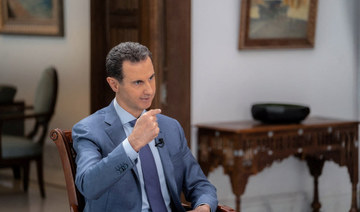ANKARA: Following the killing of 33 Turkish soldiers in northeastern Syria on Thursday night, NATO held an emergency meeting on Friday at the request of Ankara under Article 4 of the alliance’s founding treaty.
The article permits any ally to ask for consultations if it feels its territorial integrity, political independence or security is under serious threat. Five years ago, Turkey referred to the article over attacks on its soil from Syrian territory.
“Even in the face of the tragic outcome of the Idlib attacks, we shouldn’t expect anything more than political support and words of solidarity to Turkey from NATO,” Sinan Ulgen, a former Turkish diplomat and chairman of the Istanbul-based EDAM think tank, told Arab News.
According to Ulgen, if Turkey needs military support against attacks from Syrian forces, it should refer to the US.
Besides some aerial surveillance capabilities over Syria, the alliance has no direct role in the country. Its members are conflicted over deep disagreements on Turkey’s actions.
How NATO will react is uncertain if Ankara requests its assistance under Article 5 of the Washington Treaty — which requires all allies to come to the defense of another member under attack — because the attack did not occur on Turkish soil.
Meanwhile, large numbers of migrants are waiting at the Turkish border with Greece and Bulgaria for entry into European territories.
Greece has tightened its control over land and sea borders after Ankara announced that it would no longer prevent refugees from fleeing to Europe.
Turkish news agencies showed footage of hundreds of people, including women and children, walking in northwest Turkey toward the EU border in tough, wintry conditions.
Mehmet Ogutcu, chairman of the London Energy Club and a former diplomat, criticized Ankara’s move to ask for Western security support in Syria while also threatening them with the refugee card.
“It is a move that contradicts international law,” he told Arab News.
Turkey currently hosts approximately 4 million Syrian refugees. They have often been used as a bargaining chip with Western countries to barter for protection.
FASTFACT
The fate of Moscow-Ankara ties remain a concern following the violence under Russian-controlled airspace.
Navar Saban, a military analyst at the Omran Center for Strategic Studies in Istanbul, said: “Opening the gates for refugees is a bargaining card to push NATO to activate Article 5, but it cannot trigger a joint defense clause for Syrian territories.”
Saban added: “Refugees shouldn’t be considered an asset to be used in different conditions. They are people.”
The EU called on Ankara to uphold its 2016 migrants’ deal to cut the volume of migrant flow toward the continent.
Meanwhile, the fate of Moscow-Ankara ties remain a concern following the violence under Russian-controlled airspace.
Independent Syria analyst Danny Makki said the confrontation between Turkey and Russia over Idlib reached new heights with the air strikes on Turkish forces.
“Although Russian jets targeting Turkish soldiers in their sorties over Idlib has become an almost-daily occurrence, yesterday’s events now give the standoff in Syria’s last rebel-controlled province added dimensions,” he told Arab News.
However, experts don’t expect any Turkish withdrawal following rising casualties in Idlib.
Ogutcu said: “Any withdrawal would pull Turkey into another crisis. Ankara will accelerate its diplomatic engagement with Russia for aerial support in the region. As a gesture, NATO can also ask its European members to deploy air defense batteries on TuWWWrkish soil to boost its security.”
Makki agreed: “Turkey is unlikely to pull back from what it sees as a national security issue, while Russia has been continuing to exert its hegemony and dominate the Syrian arena,” he said, adding: “Thursday’s events are a watershed moment in Turkish-Russian relations, which have been teetering on the brink since the Syrian regime offensive began advancing quickly in Idlib.”
Ankara has rejected Moscow’s claim that Turkish troops killed in Idlib were embedded with “terrorist elements.”
Turkish Defense Minister Hulusi Akar said: “During this attack, there were no armed groups around our military units.”
Makki said Turkey has been quiet on Idlib: “Ankara is unwilling to even admit that Russia was behind the attacks, preferring to say that the ‘Assad regime’ conducted the strikes.
“Turkey is clearly frightened of a costly escalation with Russia and hasn’t received the support it expected from NATO and the West. It has to make a decision on how far it is going to go to maintain its Idlib policy, especially as Russia has proven indifferent to escalation.”
Speaking after the emergency meeting of NATO in Brussels, the alliance’s Secretary-General Stoltenberg said it condemned the attack.
“The allies condemn the continued indiscriminate airstrikes by the Syrian regime and Russia in Idlib province,” he said and called on them “to stop their offensive to respect international law and to back UN-led efforts for a peaceful solution.”


























